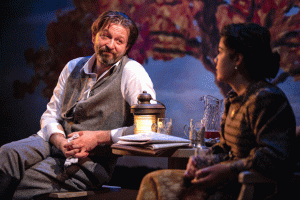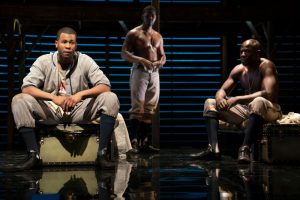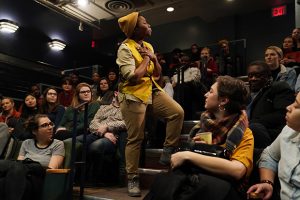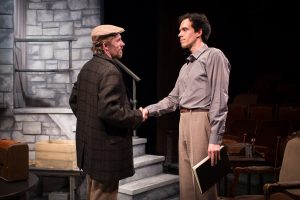
Raquel has a rough life. In Birthday in the Bronx, her character name is Rocky. She’s a bruiser of a field hockey player having collected broken bones and bloody scars. Two noxious sportscasters comment about the atrocious playing conditions. “I understand funding is tight” but the field is all muddy. Earlier in the day, girls from a “better school” looked like goddesses.
Rocky’s talent is noticed and she receives an offer to play at a rich school near Boston. That school is so white. How white is it? The hockey stick is even white. The first student we meet is named Pretty White Girl. In her opening lines she blurts “audits and yachts” followed by “inheritance offshore” and “tennis camp au pair escrow.” The language is exaggerated gobbledygook but somehow the laughs do not land.
Even the teacher spouts gibberish meant to satirize the one percent. She squawks “board of directors heirloom tomatoes” and “Downsize? Ha! Investor relations.” Parts of Paul Hufker’s new play contain quirky satire. In a world of woke, this story attempts to vilify the non-woke.
Teeth, another pretty white girl, cannot have Rocky’s birthday party at her house because mom said no. Noam Chomsky might pop by. Rocky doesn’t want anything for her big day except for her bones to heal. The pretty white girls play nasty games like peeing in her bed. The cake? Rocky wants Fudgey the whale. Lips insists on a real bakery cake “like the time when Arthur Miller came to my house.” In a hyper-satirized environment, that joke might land.
Unfortunately for Rocky, home life does not seem significantly better. Her positive exterior covers lots of brokenness. Everyone seems to treat her badly regardless of race or relation. The sting of what might be an edgy and purposefully uncomfortable comedy instead comes across as a disjointed Mean Girls.
The two men in the radio booth take a walk to Kayville Train Town where they let us know, in no uncertain terms, that they are racist. Wife Nancy is going to make “pink border wall” for dinner. The recipe? “Cook green card, real low and slow… where are your papers until you gotta stab it with a fork!” If anyone does get in over the border wall, “just kill em an grill em.” That could be sickly funny. That could also be inky dark. In this production directed by Michaela Escarcega, the scene falls flat.
A lamb motif dominates this play. Rocky finds one in a garbage can. A sports announcer reads advertisements for the meat. Rocky’s dream sequences feature a Bronx legislator who is represented as a lamb. To be honest, I needed to consult the script to figure that detail out. Another funny line appears: “We don’t speak Spanish and we don’t speak rich, but we’re willing to learn rich.”
Is Rocky internalizing her own guilt about wanting to escape her roots and claw her way, sticks flying, to the greenfield pastures of the one percent? Along the way encountering giant swaths of racism in the form of white America? Her childhood roots cloud that potentially ripe target. Everyone just seems so mean. Birthday in the Bronx feels more like a tale of psychological abuse. Her teammates taunt her shouting “rice and beans bitch” which says it all.
Sigrid Wise gamely portrays all the pretty white girls and, therefore, the group scene doesn’t have the impact as it does on the page. Suzelle Palacios does a nice job traversing the many moods of Rocky. She earns the necessary sympathy. The finest moment of this production is the high strung closing speech delivered by Evans Formica, one of the heinous white men.
Sports metaphors, evil carnivores, societal injustice, sorority hazing, dysfunctional families, violence, racism and other assorted topics create a very crowded and confusing story. Birthday in the Bronx has some ideas and demonstrated wit as read on the page. This production is far too jumbled and unfocused, however, to make any sense out of this play.










You must be logged in to post a comment.